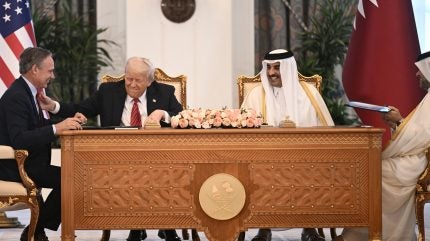
US President Donald Trump has been in the Middle East, and between receiving gifts that could well be seen as bribes and heaping praise on leaders with questionable records, he has apparently played a major role in a deal between Qatar Airways and Boeing, which the White House described as “historic”.
According to that statement, Qatar’s flag carrier will spend $96 billion on “up to 210 American-made Boeing 787 Dreamliner and 777X aircraft powered by GE Aerospace engines.”
The deal is big, but how “historic” is it?
Boeing confirmed the order comprises of 130 787 Dreamliners, 30 777-9s, and options for a further 50 Dreamliners or 777X jets.
That certainly makes it the biggest order of Dreamliners the Washington-based plane manufacturer has received, and Qatar Airways’ largest fleet order.
The carrier currently operates a fleet of 150 Boeing planes across its passenger and freight divisions.

US Tariffs are shifting - will you react or anticipate?
Don’t let policy changes catch you off guard. Stay proactive with real-time data and expert analysis.
By GlobalDataSigned, not delivered
But traders showed only tentative hopes for the deal, with Boeing’s stock rising a mere 0.5% on the NYSE yesterday. The company would likely have hoped for a bigger vote of investor confidence after such a big signing.
But this reflects the fluid nature of airline purchase deals. It’s not uncommon for deliveries from such contracts to end up being fewer than initially announced.
That brings us neatly to one of the other largest deals Boeing has made in the recent past.
In 2023 Air India signed a deal with Boeing for 190 737 MAX aircraft, 20 787 Dreamliners and ten 777X aircraft. It included options for 50 additional 737 MAX jets and 20 787-9 aircraft.
But in February 2025 the airline’s CEO Campbell Wilson said it was pausing the options, because Boeing’s internal troubles had created a massive production backlog. In Wilson’s words, “We don’t want to commit to anything until we have confidence of when it’s going to come.”
It’s worth noting that Trump’s own tariff agenda may well harm Boeing’s ability to fix its backlog and fulfil the orders, because it sources materials and parts from outside the US.
While no timescale for the manufacture and delivery of the planes was given by Qatar Airways or Boeing, Stephanie Pope, president and CEO of Boeing Commercial Airplanes said: “Our team is looking forward to building 787s and 777s for Qatar Airways into the next decade.”
Boeing’s own website lists more than 6,200 “unfilled” orders, including 296 planes for United Airlines, 449 for Southwest Airlines, 144 for Air India, 205 for Emirates, and 179 for Ryanair.
For context, in its most productive year of the past decade (2018), Boeing delivered 806 planes. Since the pandemic, that number has been consistently in the 300-400 range.
Biggest ‘widebody’ deal
While the Qatari deal is the largest of Boeing’s widebody offerings, it’s not actually the largest order the manufacturer has ever received.
As noted above, Boeing’s orderbook has some sizeable entries. Of course, not all of these are part of single orders.
But of those 179 planes destined for European low-cost carrier Ryanair, at least 150 originate from a 2023 deal that could reach 300 737 MAX aeroplanes.
“Ryanair is pleased to sign this record aircraft order for up to 300 MAX 10s with our aircraft partner Boeing,” its CEO Michael O’Leary said at the time.
The White House statement declared Trump the “dealmaker in chief” [sic] after the signing between the Qatari and US companies. It’s probably too early to make that kind of declaration, and it’s unclear how much Trump himself actually did (it was Boeing CEO Kelly Ortberg who did the physical signing), but if it’s completed, it would certainly be a huge purchase.



